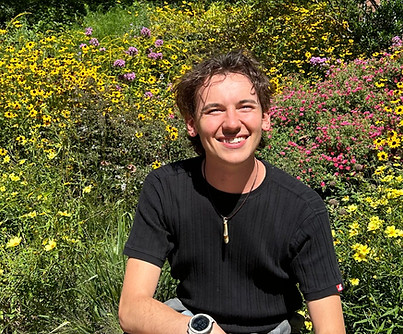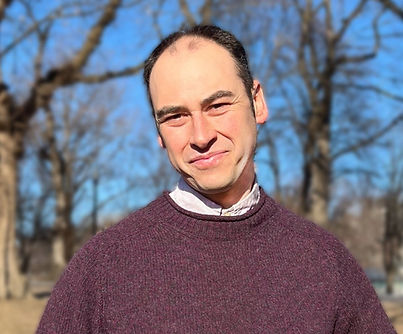Keynote Speakers

Coakee William Wildcat
Founder, Mother Tree Food & Forest
Director, EcoRestoration Alliance
Director, School of Constructive Arts
Coakee integrates western science with modern and ancestral agroecology and land management traditions. He studied the Miyawaki method of reforestation with Afforestt, and combines syntropic agroforestry and other systems of agroecology, Elaine Ingham soil science, landscape water retention, and his studies in mycology, ecology, botany, and Indigenous agroforestry and ecological land management systems into a single school of thought.

Doug Tallamy
Founder, Homegrown National Park
Doug Tallamy is a Professor in the Department of Entomology and Wildlife Ecology at the University of Delaware, where he has authored 115 research publications and has taught insect related courses for 45 years. His books include Bringing Nature Home, Nature's Best Hope, The Nature of Oaks, and his latest book How Can I Help.

Hannah Lewis
Author, Mini-Forest Revolution
Project Manager, Renewing the Countryside
Hannah is the author of Mini-Forest Revolution: Using the Miyawaki Method to Rapidly Rewild the World, which was translated into French, German, and Italian, and is the 2023 winner of a Nautilus Book Award. Hannah has an MS in Sustainable Agriculture and Sociology from Iowa State University and a BA in Environmental Studies from Middlebury College. She lives in Minneapolis, where she works for the non-profit Renewing the Countryside.

Heather Schibli
Assistant Professor, School of Environmental Design and Rural Development, University of Guelph
Administrator, Network of Nature
Heather Schibli, OALA, CSLA, ISA, is a landscape architect and ecologist whose practice and research are rooted in a deep appreciation for biological diversity. Life—endlessly inventive in both form and function—is increasingly recognized not only as a manifestation of, but also as a co-creator in, complex relationships. Philosopher Donna Haraway captures this dynamic eloquently: “[I]f we appreciate the foolishness of human exceptionalism then we know that becoming is always becoming with, in a contact zone where the outcome, where who is in the world, is at stake” (When Species Meet, 2008). With over a decade of experience designing environments for both humans and non-humans, Heather’s research draws on her expertise in ecological restoration and investigates the emerging field of multispecies design. In an era marked by mass extinction and climate crisis, it is essential to embrace design practices that foster and enrich biodiversity. Landscape architects are uniquely positioned to enhance ecological health and resilience through collaborative approaches and interdisciplinary partnerships. Heather actively welcomes insights from a wide range of fields, recognizing the creative potential in cross-disciplinary exchange.
Panelists

Alexandra Ionescu
Associate Director of Regenerative Projects, Bio4Climate
Alexandra Ionescu is the Associate Director of Regenerative Projects at Biodiversity for a Livable Climate, where she leads the Miyawaki Forest Program—supporting the planting of miniforests, cultivating partnerships, and guiding strategic planning—and recently curated the inaugural 2025 Northeast Miniforest Summit. She focuses on urban afforestation using the Miyawaki Method, beaver-engineered landscapes, and floating wetlands. A lifelong student of how nature works, Alexandra’s mindset—shaped by her graduate studies in Biomimicry—is about cultivating propensities for the web of life to emerge and restore ecological function.
.

Andrew Leahy
Education & Outreach Specialist, Horn Farm Center
Andrew coordinates programs and teaches classes on foraging and ecology at the Horn Farm Center. He is a graduate of the farm’s Land Steward Training Program–a 16 week intensive where he learned about the Miyawaki Method and collaborated on designing and planting mini forests. Andrew is a proponent of reweaving ourselves into the fabric of the land. He is passionate about fostering experiences where folks feel empowered to follow this path.
.png)
Andrew Putnam
Superintendent of Urban Forestry & Landscapes, City of Cambridge
Andrew Putnam is a Massachusetts Certified Arborist, NOFA Accredited Organic Land Care Professional and TRAQ certified. He has worked at the Coty of Cambridge for seven years with 20 years experience in the field of Arboriculture.

Anita Roy Dobbs
Team Leader, Forests for Watertown
Forests for Watertown is all-volunteer, and the "baby forest" planted last October offers more opportunities than the small core team can accommodate. Anita hopes to grow that core group to hold Art and Science events at the forest, to host Community Conversations in heat-island neighborhoods, to give presentations about the Miyawaki Method, and get to know each of the forest's 700+ trees and shrubs before they grow too large and dense to access.

Beth Suedmeyer
Associate Planner, Devens Enterprise Commission
Beth is a Planner for the Devens Enterprise Commission and assists in the planning and sustainable redevelopment of Devens, a former military base being redeveloped as a model for sustainability. Beth has experience in municipal permitting, planning, and sustainability, natural resource and open space protection and restoration, and active transportation project planning and design. Prior to Devens, Beth was an Environmental Planner with the Town of Sudbury and worked for the State in various capacities. She has a passion for rewilding and raising awareness about the importance of native plants and ecosystem restoration. Beth has a Bachelor of Science Degree in Biology from the University of Illinois, Champaign-Urbana and a master’s degree in Geographic Information Science for International Development, Community, and Environment from Clark University in Worcester.

Bram Gunther
VP of Science and Development, Plan it Wild
Bram Gunther oversees the development of science programs, like the Wildr system to measure the impact of rewilding, to expand PiW's mission and goals. He oversees development of partnerships and initiatives to advance PiW. MicroForests has been an especially successful program for PiW. He was the chief of forestry, horticulture, and natural resources for New York City Parks & Recreation, the cofounder of the Natural Areas Conservancy, and now on its board of directors. He's also on the board of directors of Hilltop Hanover Farm, a sustainable farm and native plant nursery based in Westchester, NY.

Caseylee Bastien, RLA, CPSI
Landscape Architect/ Ecologist, Senior Associate, BSC Group Inc.
Caseylee Bastien RLA, CPSI, is a Senior Landscape Architect and Ecologist with the BSC Group. He specializes in leading community groups in transforming polluted, disturbed lands into functioning ecosystems. Leveraging experience in land development paired with the insights of engineers, biologists, and soil scientists, he bridges the gap between built forms and ecological function.

Hartman Deetz (Mashpee Wampanoag)
Owner & Operator, Ockway Bay Wampum
Hartman Deetz is a member of the Mashpee Wampanoag tribe, who has spent over 25 years working in environmental advocacy, cultural restoration and preservation. He currently writes for cultural survival magazine, sits on seeds of wisdom foundations grant review committee, serves as a Native Cultural Consultant for Charles River Watershed Association. He performs internationally with Wampanoag Nation Singers and Dancers and is the owner-operator of Ockway Bay Wampum his cultural arts and education company.
.

Leigh Meunier
Organizer, Green & Open Somerville
Leigh grew up near Atlantic City, NJ, spending many childhood days connecting with the sun, sand, and ocean. This both gave her a deep appreciation for nature and opened her eyes early on to the environmental injustices and ecological harms associated with practices that put profit and power over people and planet. Leigh moved to Boston in 2004 and then across the Charles River to Somerville, MA in 2014. Through public and environmental education, music, community weaving, and greenspace reclamation and regeneration, she's been helping transform how we relate to ourselves, each other, and the urban ecosystem. This includes depaving with Green & Open Somerville! She and fellow depavers rip up pavement, helping cool neighborhoods, decrease flooding, and create more greenspace for trees, pollinators, and families. They do this as part of a larger Depave Network that's growing globally!
www.greenopensomerville.org/depave
www.youtube.com/watch?v=pRykE9G3JFE&t=2s
www.depave.org/network

Mary Ellen Lemay
Director, Landowner Engagement Aspetuck Land Trust
Mary Ellen Lemay is the Landowner Engagement Director for the Aspetuck Land Trust, providing outreach, education and engagement to encourage people to improve biodiversity on their land by implementing nature-based practices.
Mel’s recent work includes designing and installing climate smart projects in the City of Bridgeport, including the planting of 7 Miyawaki Forests at schools and 10 waterside buffers along river and coastal properties in the city.
Her 20 years of conservation work includes her role as co-founder of the Pollinator Pathway, CT DEEP Master Wildlife Conservationist, member of the CT Native Plant Working Group (NPWG) and board member of the Wild Seed Project in Maine.
Her academic degrees include: Bachelor of Science degree in Biology from Fairfield University, Master of Business Administration from Fordham University, Master of Environmental Management from the Yale School of the Environment.

Max Rome, PhD
Senior Stormwater Program Manager, Charles River Watershed Association
Max Rome is the Stormwater Program Manager at the Charles River Watershed Association. In this role, he works to advance projects and policies that reduce runoff, decrease nutrient pollution, and help to green watershed communities. Max completed his Ph.D. in Civil and Environmental Engineering from Northeastern University in 2022. His dissertation “From Water Quality to River Health” focused on improved monitoring of algal blooms and understanding how urban rivers recover from pollution.

Melory Brandao
Master's Student, University of Delaware
Melory Brandao is a graduate student studying Wildlife Ecology in Dr. Douglas Tallamy’s lab at the University of Delaware.She earned her B.S. in Natural Resource Conservation (Forestry) from UMass Amherst. Her research examines insect communities in Miyawaki forests in the Boston area, focusing on how planting methods affects insect biodiversity, herbivory, and urban ecosystem function. She has spent much of her career working in ecological restoration and in the traditional horticulture industry, as well as surveying for birds and pollinators for conservation research.
.

Nicholas Geron, PhD
Product Manager
Dr. Nicholas Geron is an assistant professor in Geography and Sustainability focusing on remote sensing, drone applications, urban forestry, and urban climate resilience. He uses remote sensing technologies to examine the climate impacts of urban forestry initiatives such as the Greening the Gateway Cities in Massachusetts and green retrofits of schoolyards in Philadelphia, PA. Nick is passionate about the role that Miyawaki Forests can play in mitigating extreme heat and building community resilience to climate change.

Nicolas de Brabandère
Nicolas de Brabandère, Founder of Urban Forests
Nicolas de Brabandère is a biologist, a nature guide and the founder of Urban Forests, a company based in Belgium that specializes in the creation of Miyawaki forests and biodiversity gardens. Since 2016, Nicolas has contributed to the creation of over 130 Miyawaki forests in Belgium, France and Germany. He is part of a wider community of Miyawaki forest makers and he has written multiple papers on the concept of the Miyawaki method and collecting data on the evolution of Miyawaki forests in temperate climate.

Prassede Calibi, PhD
Founder and Project Director, WIN Fast Forest
Prassede Calibi has degrees in behavioral ecology & evolution. She has over 30 years’ experience teaching (at UMass Boston, U of Chicago, Harvard Extension,) academic and professional workshops, and have served on grant committees, advisory, review and editorial boards. She has developed and consulted or collaborated on education grants, including National Science Foundation grants for $1.4M to $5M. She has peer review publications on animal behavior, ecology, pedagogy.

Walter Kittredge
Ecology Advisor and Founder of Oakhaven Sanctuary Nursery
Walter Kittredge was the Senior Curatorial Assistant at the Harvard University Herbaria for 44 years, and was also the Assistant Curator of the New England Botanical Society Herbarium for many years. He has been a board member of the Friends of the Fells, is currently a board member of the Friends of Harold Parker State Forest, and works closely with the AVIS Ecoteam doing habitat restorations removing invasive plants and planting natives. Walter runs the Oakhaven Sanctuary Nursery in North Reading creating a nature trail on the property, and has been an advisor, donor and participant in many Miyawaki groves and pollinator gardens. Walter has participated in Biodiversity Days in many localities, conducted floristic inventories of conservation areas throughout eastern Massachusetts and was co-author with Bryan Hamlin of Changes in the Flora of the Middlesex Fells Reservation published in Rhodora (2012).
.
